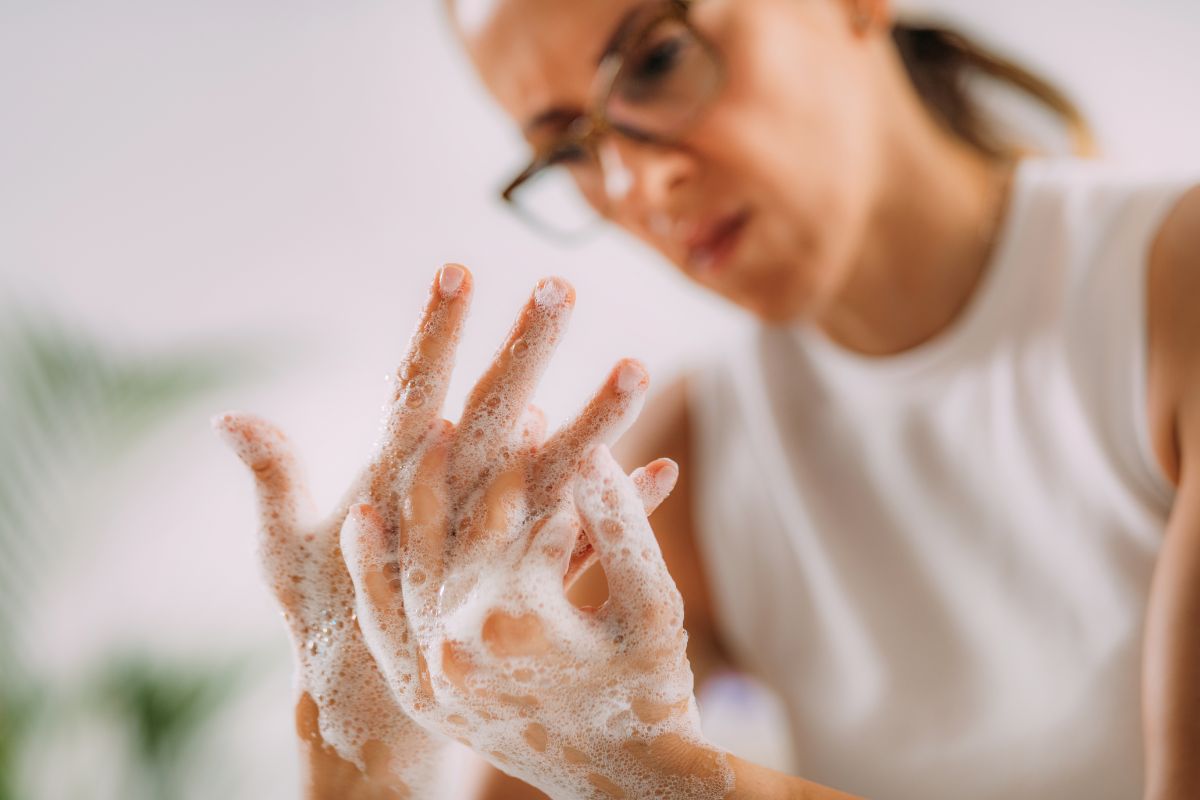Obsessive-compulsive disorder (OCD) can significantly impact your ability to live a full and healthy life. The symptoms of OCD can cause feelings of shame among those with the disorder—oftentimes, making it difficult to reach out for help. Fortunately, our OCD treatment centers in Georgia are among the best.
Our inpatient mental health treatment programs in Georgia can help you overcome mental health and substance use disorders. Visit our admissions page today to get started.
What is Obsessive-Compulsive Disorder?
Obsessive-compulsive disorder (OCD) is a type of anxiety disorder characterized by obsessive thoughts and compulsive behaviors.
According to the National Institutes of Mental Health (NIMH), “Lifetime prevalence of OCD among U.S. adults was 2.3%.” Furthermore, about “one half (50.6%) [of those with OCD] had had serious impairment,” “34.8% . . . had moderate impairment, and 14.6% had mild impairment.”
OCD has two primary symptoms: obsessions and compulsions. Along with obsessions and compulsions, people with OCD could have additional symptoms similar to those of other anxiety disorders.
What Are Obsessions?
Obsessions are uncontrollable and intrusive thoughts or urges that cause distress.
A person with OCD will have recurrent thoughts that cause shame, anxiety, stress, fear, or discomfort. These thoughts are intrusive because they seem to come out of nowhere. However, due to the disturbing nature of most obsessive thoughts, the person with OCD will struggle to disregard them.
Common obsessive thoughts include the following:
- Intense fear of dirt, germs, or getting sick
- Doubt about things like locking doors or turning off stoves
- Need for things to be perfectly ordered or balanced
- Fear of doing something embarrassing in a public place
- Worrying about losing control and inflicting harm upon yourself or others
- Unwanted thoughts on taboo subjects—often of a sexual or violent nature
While many people like to keep their homes clean and orderly, have aggressive and sexual thoughts, or struggle with self-doubt, a person with OCD feels significant distress when these thoughts occur. They can’t seem to let these thoughts go and question their meaning.
Unfortunately, trying to control obsessive thoughts only makes them stronger. As a result, they engage in irrational behaviors called compulsions as an attempt to cope.
What Are Compulsions?
Compulsions are repetitive and irrational behaviors that people with OCD use as a maladaptive coping strategy.
Sometimes, compulsions are directly related to the obsessions the person has. For instance, a person with an intense fear of contamination might spend several hours cleaning every day. And, despite their home being spotless, they never feel it is good enough.
However, some compulsions aren’t related directly to the obsessions. Instead, the person with OCD engages in rituals or repetitive thoughts to try to control or stop obsessive thinking. They might mentally count numbers or need to touch objects a certain number of times to feel “just right.”
Examples of compulsions include the following:
- Washing and cleaning (excessively)
- Checking things over and over (lights and appliances are turned off, doors are locked, etc.)
- Counting in specific patterns
- Spending a significant amount of time arranging objects a certain way
- Repeating a word, phrase, or prayer to yourself
- Trying to “force” a good thought to replace a bad one
- Hoarding objects because you worry you’ll need them someday
Overall, the goal of compulsions is to rid yourself of the obsessive thought patterns. Unfortunately, compulsive behaviors lead to worsening symptoms of shame, fear, self-doubt, and dread.
If you are stuck in a loop of obsessive thoughts that drive compulsive behaviors, then you need OCD treatment.
More On OCD: Can OCD Be Cured?

How Do I Know I Need OCD Treatment?
If obsessive thoughts and compulsive behaviors significantly impact your ability to function, then you need help from our OCD treatment centers in Georgia.
OCD can range in severity. Some people have mild symptoms that only affect them in certain areas of life. However, others have severe symptoms—they may even struggle to leave their homes.
People with OCD often engage in avoidance behaviors. This means that they go out of their way to avoid anything that triggers their obsessive thoughts. When left untreated, your symptoms will worsen, and you’ll find yourself avoiding to the point of isolation.
Signs and Symptoms of Obsessive-Compulsive Disorder
The following are common signs and symptoms of obsessive-compulsive disorder:
- Spending an hour or more each day on obsessive thoughts or compulsive behaviors
- Having stress or anxiety due to your obsessions and compulsions
- Getting no pleasure or relief from compulsive behaviors—yet you can’t stop doing them
- Constantly seeking reassurance from others
- Unable to stop compulsive behaviors, despite realizing they are irrational
- Never feeling at ease due to excessive worry or the need to have things perfect
- Avoiding significant events in your life for fear of being triggered
If you have symptoms like those mentioned above, then our OCD treatment centers in Georgia can help you.

Our Programs That Offer Treatment for OCD
At Serenity Grove, we offer inpatient and outpatient treatment programs to help you overcome symptoms of OCD, including:
- Residential Treatment: During residential (inpatient) treatment, you’ll live in our comfortable and homelike setting during your program. This will provide you with the distraction-free start you’ll need to recover from severe symptoms of OCD and dual-diagnosis disorders.
- Partial Hospitalization Program (PHP): Also called “day treatment,” a PHP program is the next step after residential treatment. You’ll attend PHP 5-6 days per week for about 6-8 hours each day.
- Intensive Outpatient Program (IOP): After PHP, you can step down to the next level of care called an IOP program. During IOP, you’ll attend sessions for about 3-4 hours nearly every weekday. This gives you a significant amount of treatment with a flexible schedule.
- Outpatient Program (OP): A regular outpatient program (OP) is our most flexible and least restrictive level of care. During OP, you’ll meet with your therapist as needed—typically weekly for about an hour per session.
About Dual Diagnosis Disorders
Mental health disorders often co-occur with addiction, and having both is called a dual-diagnosis disorder.
Oftentimes, people with OCD attempt to self-medicate with drugs or alcohol. They might try to use substances to control their obsessive thoughts. Alternatively, substance abuse could be a way of coping with the stress and anxiety that accompanies OCD.
Regardless, if you have OCD and a co-occurring addiction, you need dual-diagnosis treatment. That way, you can address both issues at the same time. This provides the best outcomes for both disorders.
How is OCD Treated?
OCD is treated with a combination of psychotherapy, psychiatric medications, and holistic approaches.
At our OCD treatment centers in Georgia, we believe that treating mental health disorders requires a multi-faceted approach. That way, all of your symptoms—mental, emotional, physical, and social—are addressed.
The following services can be part of your OCD treatment plan:
- Individual Psychotherapy: One-on-one counseling or individual therapy is among the most common types of mental health treatment. You and your therapist will discuss symptoms and find coping skills.
- Group Therapy: Many treatment centers have group therapy so clients with shared experiences can help each other. These sessions are led by a therapist, who will encourage participation, provide topics, give feedback, and facilitate the discussion.
- Cognitive-Behavioral Therapy (CBT): CBT is one of the most effective ways of treating a variety of mental health disorders, including OCD, depression, and anxiety. It is great for OCD because cognitive-behavioral therapy addresses unhealthy thought patterns that lead to problematic behaviors.
- Dialectical Behavioral Therapy (DBT): Originally developed to treat borderline personality disorder (BPD), dialectical behavioral therapy can help with several mental disorders and co-occurring addictions.
- Trauma Therapy: Oftentimes, underlying trauma is the cause of mental health and substance use disorders. Therefore, if unresolved traumatic experiences are at the root of your OCD symptoms, trauma treatment can help you.
- Meditative Therapy: It’s important to treat the physical symptoms of OCD as well as the mental symptoms. Meditative therapy can help you learn how to reduce stress and let go of obsessive thoughts.
- Yoga Therapy: Similar to meditative therapy, yoga therapy can provide an outlet for stress reduction and relaxation. It can also improve your ability to focus on the present moment.
- Family Counseling: Mental health disorders, like OCD, can cause significant stress among the family members of those who struggle. Family counseling can help you repair these important relationships in your life.
Get Help for OCD Today
Obsessive-compulsive disorder (OCD) can significantly impact the lives of those affected. Even mild OCD can lead to a diminished quality of life. However, when left untreated, OCD can lead to extreme avoidance behaviors, co-occurring substance abuse, and other negative consequences.
Contact our OCD treatment centers in Georgia to get help today.

